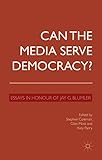Can the media serve democracy? : essays in honour of Jay G. Blumler / Edited by Stephen Coleman, Giles Moss, Katy Parry
Material type: TextPublication details: Houndsmills ; New York : Palgrave Macmillan, c2015.Description: xiii, 251 p. ; 23 cmISBN:
TextPublication details: Houndsmills ; New York : Palgrave Macmillan, c2015.Description: xiii, 251 p. ; 23 cmISBN: - 9781137467911
- 320.014 CA NT
| Item type | Current library | Call number | Status | Date due | Barcode | |
|---|---|---|---|---|---|---|
| REGULAR | University of Wollongong in Dubai Main Collection | 320.014 CA NT (Browse shelf(Opens below)) | Available | T0061115 |
Browsing University of Wollongong in Dubai shelves, Shelving location: Main Collection Close shelf browser (Hides shelf browser)

|

|

|

|

|

|

|
||
| 320.011 HA HO How we invented freedom & why it matters / | 320.011 MA DI Divided : | 320.011 MI PO Political philosophy : | 320.014 CA NT Can the media serve democracy? : | 320.014 CH HY The hybrid media system : | 320.014 CH ME Media control : | 320.014 CR PE Performing politics : |
Includes bibliographical references and index.
"This landmark collection brings leading scholars in the field of political communication to debate one of the most important questions of our age: Can the media serve democracy? For the media to be democratic, they must enter into a positive relationship with their readers, viewers and listeners as citizens rather than consumers who buy things, audiences who gaze upon spectacles or isolated egos, obsessed with themselves. The media's first task is to remind people that they are inhabitants of a world in which they can make a difference. By enabling citizens to encounter and make sense of events, relationships and cultures of which they have no direct experience, the media constitute a public arena in which members of the public come together as more than passing strangers"--
There are no comments on this title.
